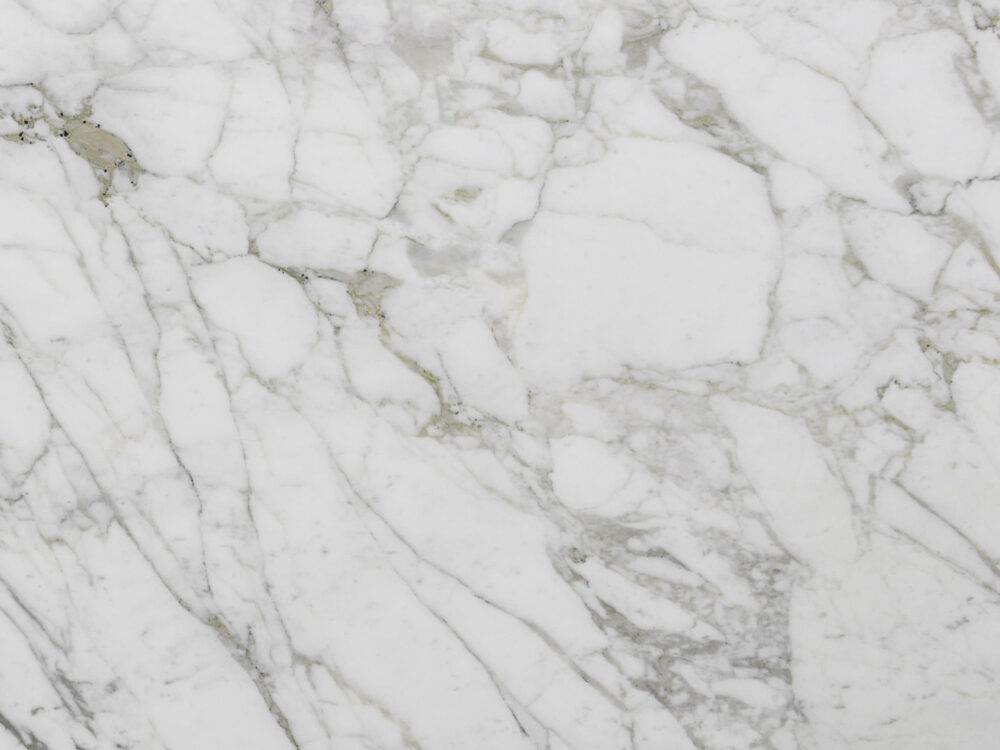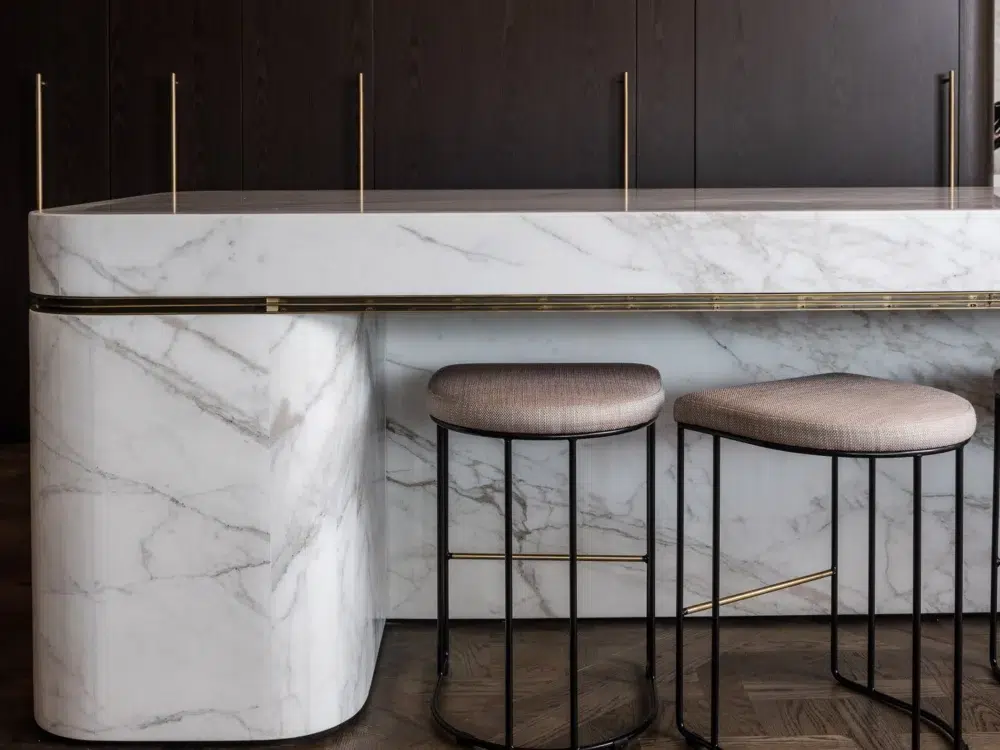White Marble Slabs
White marble, with its pristine beauty and timeless elegance, has been a symbol of sophistication and luxury for centuries. Its unique veining and soft tones have made it a favoured choice in architecture and design, gracing everything from ancient sculptures to modern homes.
View Our white marble slabs COLLECTION
-
Fusion Quartzite
Fusion QuartziteFusion Quartzite is distinguished by its rich color palette and intricate patterns, exemplifying nature’s artistry. Deep grey hues are interwoven with accents of gold, beige, and olive, creating a dynamic and captivating visual effect. Its unique and versatile design makes Fusion an exceptional choice for adding sophistication and character to any space.
-
Calacatta Vagli Marble
Calacatta Vagli MarbleCalacatta Vagli Marble is a luxurious marble sourced from the Carrara Mountain ranges of Italy, characterised by its warm white background against the soft earthy-gold veining. A unique aspect of Calacatta Vagli is that it has a striking pattern for those looking to make a statement in large format applications, such as a kitchen island or feature wall, yet due to its brecciated pattern this stone also looks impactful in smaller segments such as shower niches or a fireplace hearth.
-
Calacatta Statuario Marble
Calacatta Statuario MarbleCalacatta Statuario marble, a distinctive material that personifies grace and elegance. Hand-selected from the choicest quarries of Italy, this exquisite marble, available at Avant Stone, is highly sought after by discerning homeowners, architects, and designers alike. The Calacatta Statuario marble is renowned for its crisp white background adorned with striking broad grey veins, an unparalleled blend of purity and drama that promises to transform any space into a vision of refined grandeur. Each slab is unique, embodying a timeless beauty that transcends the ephemeral trends, thus offering a sense of permanence and enduring appeal. Known for its exceptional versatility, the Calacatta Statuario marble is ideal for kitchens, bathrooms, fireplaces, and even accent walls, elegantly enhancing the ambiance of any setting with its remarkable aesthetic and superior quality. Despite its luxe appeal, the Calacatta Statuario marble is incredibly robust, balancing both functionality and aesthetics with effortless ease.

Calacatta Marble Range
View Our Calacatta marble slabs range
-
Calacatta Vagli Marble
Calacatta Vagli MarbleCalacatta Vagli Marble is a luxurious marble sourced from the Carrara Mountain ranges of Italy, characterised by its warm white background against the soft earthy-gold veining. A unique aspect of Calacatta Vagli is that it has a striking pattern for those looking to make a statement in large format applications, such as a kitchen island or feature wall, yet due to its brecciated pattern this stone also looks impactful in smaller segments such as shower niches or a fireplace hearth.
-
Calacatta Oro Marble
Calacatta Oro MarbleCalacatta Oro Marble is among the most sought-after marbles in the world. This Marble is quarried in the Carrara mountain ranges of central Italy. The pristine white background of this marble is contrasted with the bold warm grey veining. Calacatta Oro is one of the classic Italian white Marble, having been used on high-end luxury developments for centuries. The timeless nature of the color palette & magnificence of this stone leaves it as one of the most prized marbles in the Avant Stone range.
Carrara Marble Range
Why Choose White Marble Slabs for Your Space?
TIMELESS ELEGANCE
PREMIUM RANGE OF NATURAL STONE
VERSATILE APPLICATIONS
DURABLE AND EASY TO MAINTAIN
HISTORICAL SIGNIFICANCE
Types of White Marble Slabs
CALACATTA MARBLE
Coming from Italy, Calacatta Marble is a premium choice known for its dramatic veining and overall luxurious appearance. Grey and gold, the veins are very thick and bold, greatly contrasting with their white background. Use this Calacatta Marble to make a statement in any area by adding a sense of opulence and real elegance to it.
CARRARA MARBLE
Carrara marble is a timeless and elegant natural stone, known for its soft white or grey background with delicate veining. Highly prized for its refined appearance, it’s a popular choice for countertops, walls, and floors, bringing a luxurious yet classic feel to any space
STATUARIO MARBLE
COTE D’AZUR MARBLE
ARCTIC WHITE MARBLE
NEW YORK MARBLE
White Marble Slabs for
Home Interior
White marble, characterized by its sparkling surface and cool tones, has long been a cherished material for home interiors. The allure of white marble lies in its ability to bring a sense of grandeur and tranquillity to any space. When used in home interiors, it transforms the area into a bright and airy space. The beauty of white marble Slabs lies not just in their classic appeal but also in their versatility. Whether it’s the living room floors or the bathroom walls, white marble adds a touch of elegance.
Moreover, the unique patterns of veins in each marble tile ensure that no two spaces will ever look the same. Architects and interior designers often recommend white marble for its ability to reflect light, thereby enhancing the spaciousness of a room. In Melbourne, Australia, where contemporary designs blend with natural beauty, white marble finds its place in various luxury homes and spaces.
How to Choose the Right
White Marble Slabs for Your Space
From the marble type itself to its application and general appearance, several variables must be put into consideration when choosing the best white marble for your place. You will want a stone that can complement your interior decor while offering you the necessary strength and elegance.
UNDERSTANDING WHITE MARBLES
UNDERSTAND YOUR SPACE AND APPLICATION
ASSESSING THE AESTHETIC VALUE
CONSIDERING PRICE AND BUDGET
MATCHING WITH OTHER MATERIALS
How to Care for and Maintain
Your White Marble
Proper care and maintenance have been keys to longevity with the pristine looks of white marble slabs. Regularity in cleaning and protecting makes sure that unwanted damage does not happen, and it preserves the marble, which is naturally a beautiful material. So, here are some simple ways to efficiently take care of this stone.
REGULAR CLEANING
RE-SEAL PERIODICALLY
AVOID SPILLS AND STAINS
USE COASTERS AND MATS
Natural Stone Slab Supplier
Avant Stone brings together 20 years of stone industry experience to provide you with a range of globally sourced stone slabs including Marble slabs, Granite slabs and Quartzite Slabs.
We aim provide you quality service and distinctive stone products for your home or your commercial space. Avant Stone is the premier Stone Supplier of Granite, Quartzite and Marble slabs in Sydney.
Our showroom is located centrally in Greenacre, a mere 20 minutes from Sydney & Parramatta CBD.
Give us a call: 0298170037
Email us at: info@avantstone.com.au









